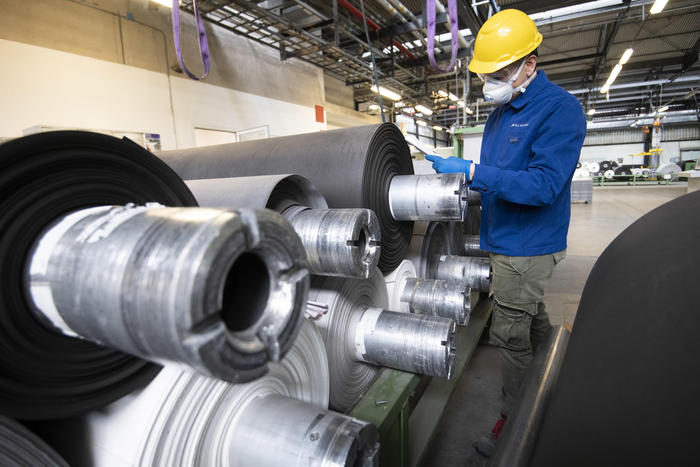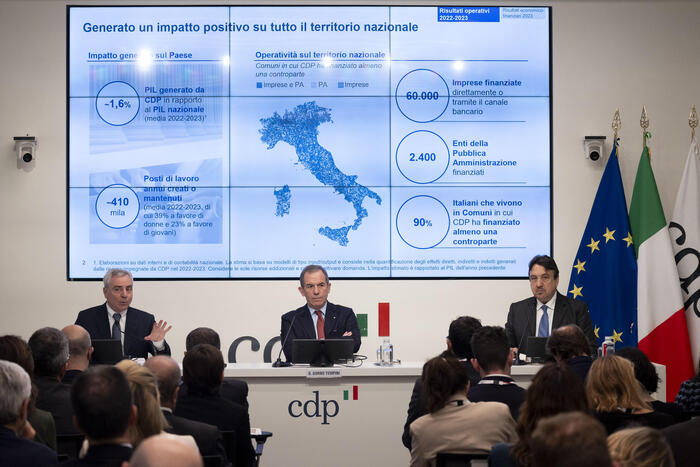The impact of the gas price on the Italian economy could be worth up to 3.2% of GDP in the two-year period 2022-23.
This is the estimate of the Confindustria Study Center with two simulations.
With the price of gas, up to the end of 2023 at 235 € / mwh (average value in August), the impact for the Italian economy (compared to the average price of 99 euros in the first 6 months of 2022) is estimated at a lower GDP growth of 2.2%.
With the price at € 298 / mwh (the average level expected from futures) the reduction in the two-year period would be 3.2%.
With, in the two scenarios, respectively 383 thousand and 582 thousand less employed
"Record gas prices, inflation and higher rates: difficult context in the second half of 2022. The scenario turns downwards".
The Confindustria Study Center in its Congiuntura flash underlines that "the resilience of the industry is on the ropes, after too many months of the impact of expensive energy on the margins of companies: investments will suffer".
For Csc, "record inflation erodes household income and threatens consumption, protected (in part and not for much longer) by accumulated savings, and the rates raised by the ECB" will give a further recessionary impulse ". Confindustria notes, it is urgent to mitigate the energy price increases or their effects. First of all with compensatory interventions for families and businesses "which however - we read - are very expensive,
sustainable for limited periods;
Italy is already among the European countries with the largest budget intervention for energy. "" Regulatory interventions are therefore needed: allocating part of the electricity produced from renewables to businesses, at a fixed and more moderate price;
reform the electricity market, uncoupling the price of electricity from that of gas;
impose an EU cap on the price of gas in Europe, to act directly on the heart of the crisis.
Together, we need to reduce energy dependence on other (more renewable) countries and reduce national consumption of gas and electricity, as we are starting to do.
But we must act quickly, along all these lines, if we do not want to resign ourselves to stagnation, or worse ".
Italy is already among the European countries with the largest budget intervention for energy. "" Regulatory measures are therefore needed: allocating part of the electricity produced from renewables to businesses, at a fixed and more moderate price;
reform the electricity market, uncoupling the price of electricity from that of gas;
impose an EU cap on the price of gas in Europe, to act directly on the heart of the crisis.
Together, we need to reduce energy dependence on other (more renewable) countries and reduce national consumption of gas and electricity, as we are starting to do.
But we must act quickly, along all these lines, if we do not want to resign ourselves to stagnation, or worse ".
Italy is already among the European countries with the largest budget intervention for energy. "" Regulatory measures are therefore needed: allocating part of the electricity produced from renewables to businesses, at a fixed and more moderate price;
reform the electricity market, uncoupling the price of electricity from that of gas;
impose an EU cap on the price of gas in Europe, to act directly on the heart of the crisis.
Together, we need to reduce energy dependence on other (more renewable) countries and reduce national consumption of gas and electricity, as we are starting to do.
But we must act quickly, along all these lines, if we do not want to resign ourselves to stagnation, or worse ".
electricity produced from renewables to businesses, at a fixed and more moderate price;
reform the electricity market, uncoupling the price of electricity from that of gas;
impose an EU cap on the price of gas in Europe, to act directly on the heart of the crisis.
Together, we need to reduce energy dependence on other (more renewable) countries and reduce national consumption of gas and electricity, as we are starting to do.
But we must act quickly, along all these lines, if we do not want to resign ourselves to stagnation, or worse ".
electricity produced from renewables to businesses, at a fixed and more moderate price;
reform the electricity market, uncoupling the price of electricity from that of gas;
impose an EU cap on the price of gas in Europe, to act directly on the heart of the crisis.
Together, we need to reduce energy dependence on other (more renewable) countries and reduce national consumption of gas and electricity, as we are starting to do.
But we must act quickly, along all these lines, if we do not want to resign ourselves to stagnation, or worse ".
we need to reduce energy dependence on other (more renewable) countries and reduce national consumption of gas and electricity, as we are starting to do.
But we must act quickly, along all these lines, if we do not want to resign ourselves to stagnation, or worse ".
we need to reduce energy dependence on other (more renewable) countries and reduce national consumption of gas and electricity, as we are starting to do.
But we must act quickly, along all these lines, if we do not want to resign ourselves to stagnation, or worse ".
The Confindustria study center underlines the risks of a stop in supplies.
"The abnormal increase in gas prices and the risks of shortages on volumes have a heavy impact on Italy and the other European countries, gas importers. By holding back the other economies, this penalizes Italy even more, through a lower export", yes law.
If the flows from Russia were to stop completely, Italy and the other European countries could also have problems on volumes.
In the event of a block since October, considering the alternative sources to Russian gas already in place, those that should be available by the first months of 2023, the acceleration of storage recorded until August, in Italy there would be a significant shortage of gas of 10.9 mm3, between the fourth quarter of 2022 and the first of 2023,
but much lower than estimated before the summer.
Using the strategic reserve (4.5 bcm), a gap of 6.4 bcm (8% of consumption) would be reached.
According to the Italian emergency plan and the recent regulation at EU level, the shortage could still have a significant impact on parts of the Italian industry (which needs a total of 9.5 bcm), causing closures and a drop in added value.
A reduction in energy consumption, especially with measures to limit cooling and heating in buildings (the Government estimates between -5.3 and -8.2 mm3), could almost cancel the gas shortage.
With regard to the impact on business costs, the effects of the jump in the price of gas could affect manufacturing up to 10.2% in 2022 and 13.7% in 2023, more than tripled compared to the pre-crisis 3.9%.
Using the strategic reserve (4.5 bcm), a gap of 6.4 bcm (8% of consumption) would be reached.
According to the Italian emergency plan and the recent regulation at EU level, the shortage could still have a significant impact on parts of the Italian industry (which needs a total of 9.5 bcm), causing closures and a drop in added value.
A reduction in energy consumption, especially with measures to limit cooling and heating in buildings (the Government estimates between -5.3 and -8.2 mm3), could almost cancel the gas shortage.
With regard to the impact on business costs, the effects of the jump in the price of gas could affect manufacturing up to 10.2% in 2022 and 13.7% in 2023, more than tripled compared to the pre-crisis 3.9%.
Using the strategic reserve (4.5 bcm), a gap of 6.4 bcm (8% of consumption) would be reached.
According to the Italian emergency plan and the recent regulation at EU level, the shortage could still have a significant impact on parts of the Italian industry (which needs a total of 9.5 bcm), causing closures and a drop in added value.
A reduction in energy consumption, especially with measures to limit cooling and heating in buildings (the Government estimates between -5.3 and -8.2 mm3), could almost cancel the gas shortage.
With regard to the impact on business costs, the effects of the jump in the price of gas could affect manufacturing up to 10.2% in 2022 and 13.7% in 2023, more than tripled compared to the pre-crisis 3.9%.
4 mmc (8% of consumption).
According to the Italian emergency plan and the recent regulation at EU level, the shortage could still have a significant impact on parts of the Italian industry (which needs a total of 9.5 bcm), causing closures and a drop in added value.
A reduction in energy consumption, especially with measures to limit cooling and heating in buildings (the Government estimates between -5.3 and -8.2 mm3), could almost cancel the gas shortage.
With regard to the impact on business costs, the effects of the jump in the price of gas could affect manufacturing up to 10.2% in 2022 and 13.7% in 2023, more than tripled compared to the pre-crisis 3.9%.
4 mmc (8% of consumption).
According to the Italian emergency plan and the recent regulation at EU level, the shortage could still have a significant impact on parts of the Italian industry (which needs a total of 9.5 bcm), causing closures and a drop in added value.
A reduction in energy consumption, especially with measures to limit cooling and heating in buildings (the Government estimates between -5.3 and -8.2 mm3), could almost cancel the gas shortage.
With regard to the impact on business costs, the effects of the jump in the price of gas could affect manufacturing up to 10.2% in 2022 and 13.7% in 2023, more than tripled compared to the pre-crisis 3.9%.
the shortage could in any case have a significant impact on parts of the Italian industry (which needs a total of 9.5 bcm), causing closures and a drop in value added.
A reduction in energy consumption, especially with measures to limit cooling and heating in buildings (the Government estimates between -5.3 and -8.2 mm3), could almost cancel the gas shortage.
With regard to the impact on business costs, the effects of the jump in the price of gas could affect manufacturing up to 10.2% in 2022 and 13.7% in 2023, more than tripled compared to the pre-crisis 3.9%.
the shortage could in any case have a significant impact on parts of the Italian industry (which needs a total of 9.5 bcm), causing closures and a drop in value added.
A reduction in energy consumption, especially with measures to limit cooling and heating in buildings (the Government estimates between -5.3 and -8.2 mm3), could almost cancel the gas shortage.
With regard to the impact on business costs, the effects of the jump in the price of gas could affect manufacturing up to 10.2% in 2022 and 13.7% in 2023, more than tripled compared to the pre-crisis 3.9%.
especially with the measures to limit cooling and heating in buildings (the Government estimates between -5.3 and -8.2 mmc), it could almost cancel the gas shortage.
With regard to the impact on business costs, the effects of the jump in the price of gas could affect manufacturing up to 10.2% in 2022 and 13.7% in 2023, more than tripled compared to the pre-crisis 3.9%.
especially with the measures to limit cooling and heating in buildings (the Government estimates between -5.3 and -8.2 mmc), it could almost cancel the gas shortage.
With regard to the impact on business costs, the effects of the jump in the price of gas could affect manufacturing up to 10.2% in 2022 and 13.7% in 2023, more than tripled compared to the pre-crisis 3.9%.







